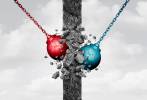We are all walking wounded
In my post-divorce dating career (two years), I’ve met at least three women (well-educated and in their 40s) who are still bearing significant open wounds caused in childhood by their fathers (just my opinion, but it seems pretty clear). It makes me think several things: 1. the incredible influence and power that parents have over their kid’s entire lives; 2. why are these educated, high-functioning people still carrying these wounds at this point in their lives? 3. what wounds am I walking around with from childhood? 4. what wounds am I inflicting on my kids? 5. most important, how can I help my kids overcome these inevitable wounds so their adulthoods won’t have very much anguish?
— F.T., Las Vegas
Recently I’ve been noticing a particular phenomenon related, I think, to your question. There is, right now in America, a historically unprecedented glut of 40- to 65-year-olds who are dating and datable. A few of these have never been married. A larger number, widowed. But the vast majority of this number are divorced, one or multiple times.
The second thing I observe, then, about this population is that these people tend to be the “walking wounded.” Even if they do not, as you mention above, have significant psychological damage from childhood, the experience of divorce alone leaves most people with scars and assorted psychic adhesions, emotional abscesses and internal bleeding.
As I have said in this space before, modern people tend to greatly underestimate the consequences of divorce to the human heart. I’m saying that, compounding all I’ve described above, this population of dating and datable divorcees tend to be unaware of their injuries, the extent of those injuries, and just how much those injuries hold jurisdiction over their behavior in the new love forays.
Now, to these observations, you add yet another kind of wound: Many people (most people?) bring from childhood one form or another of negative consequence traceable to unhappy, incompetent, neglectful, disrespectful or flat egregiously abusive experiences at the hands of mother or father.
Yes! Parents wield incredible influence and power in shaping (or deforming) the psycho-emotional development of their children. And the fact that otherwise “high-functioning, well-educated people still carry these wounds (this late in life)” makes the point in spades. These wounds don’t necessarily heal of their own accord. They tend to abscess more often than heal.
What you’re noticing is not caused by divorce. It is more likely to have contributed to the divorce! It was a wound brought to the marriage.
I remember one of my first emerging views of dating again after my divorce went something like, “Wow — these women are divorced for a reason!” Then, an icy finger traced my spine as I added the obvious rejoinder: “Which means, Mr. Kalas, that you’re probably divorced for a reason, too.”
Which brings me to your third question. It’s a liberating question. I’m saying your question is the antidote to the pernicious oblivion with which most people live their entire lives. Or, as I say repeatedly to couples in my office, “When will you stop confronting each other and start confronting yourself?”
Said another way, one of the things a midlife single person should want in a prospective life partner is consciousness! Someone committed to living consciously! Funny to think about adding it to your online dating profile but: “Looking for man/woman who knows his/her neuroses, has working knowledge of how he/she contributed to the demise of their marriage, and has the ability and the willingness to see his/her parents as they really are!”
If I was writing an online dating profile, I’d add, “Must really like and desire to be a grownup.”
The goal isn’t to promise yourself only to date people never married and without childhood wounds. The people in your dating pool are mostly divorced and always in some way wounded. No, your goal is to pursue courtships only with people who demonstrate a regular willingness to live consciously and to live accepting radical responsibility for that about which they are willing to be conscious.
Your questions four and five are, in a twist of fate, addressed in this Sunday’s column. Stay tuned.
Steven Kalas is a behavioral health consultant and counselor at Las Vegas Psychiatry and the author of “Human Matters: Wise and Witty Counsel on Relationships, Parenting, Grief and Doing the Right Thing” (Stephens Press). His columns also appear on Sundays in the Las Vegas Review-Journal. Contact him at 702-227-4165 or skalas@reviewjournal.com.























